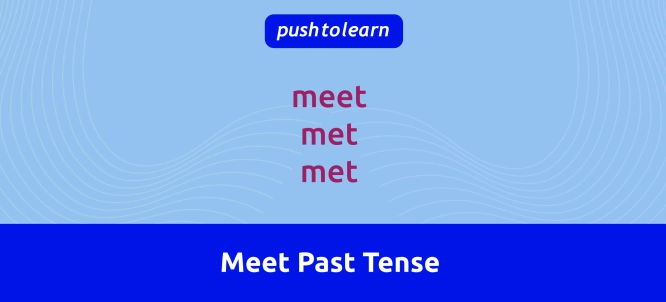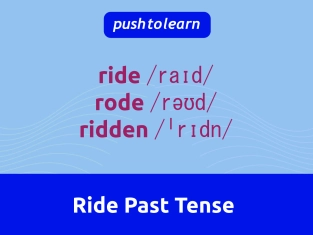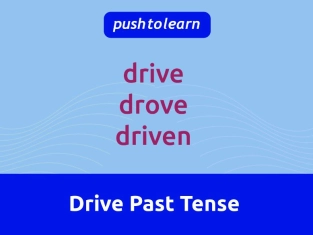by PushtoLearn
Meet Past Tense
Table of Contents
Meet Past Forms - Exercises
These exercises test different forms of the verb MEET and IRREGULAR VERBS
Meaning of Meet
The verb "meet" means to come into contact with someone for the first time, have a gathering, or encounter something unexpectedly.

Example:
-
"I meet my friends at the park every Saturday."
-
"She meets new people at work regularly."
When referring to past actions, "meet" changes to "met."
Forms of "Meet"
|
Tense |
Form |
Example Sentence |
|
Present |
meet |
"I meet my teacher every Monday." |
|
Past |
met |
"Yesterday, I met a famous author at the event." |
|
Past Participle |
met |
"She has met all the requirements for the scholarship." |
|
Present Participle |
meeting |
"They are meeting with the project team today." |
Examples of "Meet" in Sentences
Past Tense (met):
-
"I met my best friend at school years ago."
-
"They met their neighbors at the community gathering last week."
-
"She met her favorite actor during the film festival."
Past Participle (met):
-
"He has met with the manager to discuss the new project."
-
"I had met her before, but I didn’t recognize her at first."
-
"They have met every goal set for the quarter."
Common Mistakes with "Meet"
1. Confusing "meet" with "know":
Learners sometimes mix up "meet" (referring to the first time encountering someone or something) with "know" (referring to being familiar with someone or something).
-
Incorrect: "I met him for three years."
-
Correct: "I have known him for three years."
-
Incorrect: "Do you meet her well?"
-
Correct: "Do you know her well?"
2. Overusing "met" in present tense contexts:
Some learners use "met" instead of the correct form for present tense actions.
-
Incorrect: "I met new colleagues every week."
-
Correct: "I meet new colleagues every week."
-
Incorrect: "He met his clients regularly."
-
Correct: "He meets his clients regularly."
3. Using "meet" instead of "gather" or "join" in group settings:
Learners may incorrectly use "meet" in situations that describe group activities or joining events.
-
Incorrect: "We will meet the dinner party at 7 PM."
-
Correct: "We will join the dinner party at 7 PM."
-
Incorrect: "The family meets at the dining table every evening."
-
Correct: "The family gathers at the dining table every evening."
4. Misunderstanding the use of "met" in idiomatic expressions:
"Met" is often used figuratively in phrases like "met expectations" or "met with resistance," and learners may misuse it.
-
Incorrect: "The presentation met resistance to the audience."
-
Correct: "The presentation met with resistance from the audience."
-
Incorrect: "She met the success she was looking for."
-
Correct: "She achieved the success she was looking for."
5. Forgetting to use "met" with appropriate prepositions:
Certain contexts require specific prepositions, and learners sometimes omit or misuse them.
-
Incorrect: "I met him accident."
-
Correct: "I met him by accident."
-
Incorrect: "They met a disagreement during the meeting."
-
Correct: "They met with a disagreement during the meeting."
Irregular verbs play a key role in Past Simple—review this lesson to practise more. Make sure to try other Grammar Exercises A1 for more challenges. Some examples of irregular verbs are Lend, Draw, and Bring.
FAQ
What is the past tense of "meet"?
The past tense of "meet" is "met."
How do I use "met" in a sentence?
Use "met" to describe a meeting or encounter that happened in the past.
Example: "I met her for coffee yesterday."
What is the past participle of "meet"?
The past participle of "meet" is also "met."
Example: "We have met several times before."
Is "meeted" a correct word?
No, "meeted" is not correct. Always use "met" for the past tense and past participle.
Can "meet" be used figuratively?
Yes! Example: "She met the challenge with determination," meaning she faced the challenge with strength.

